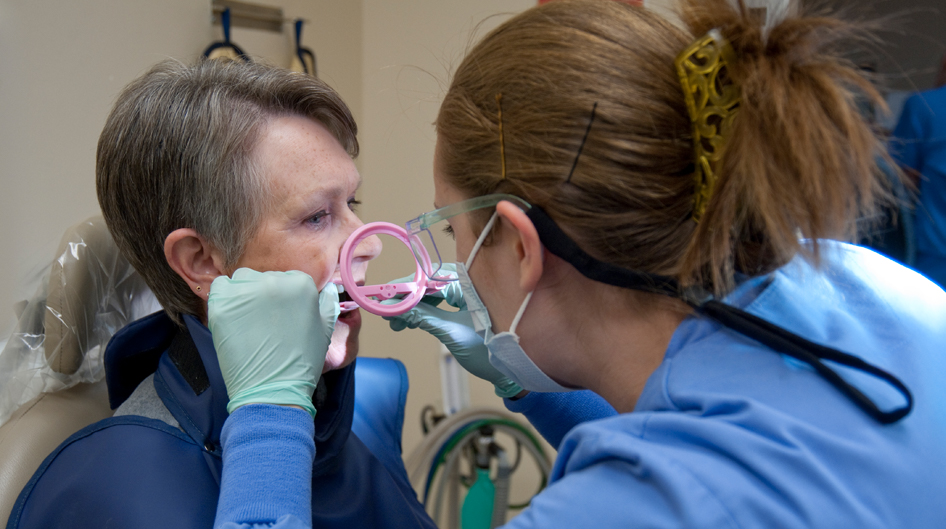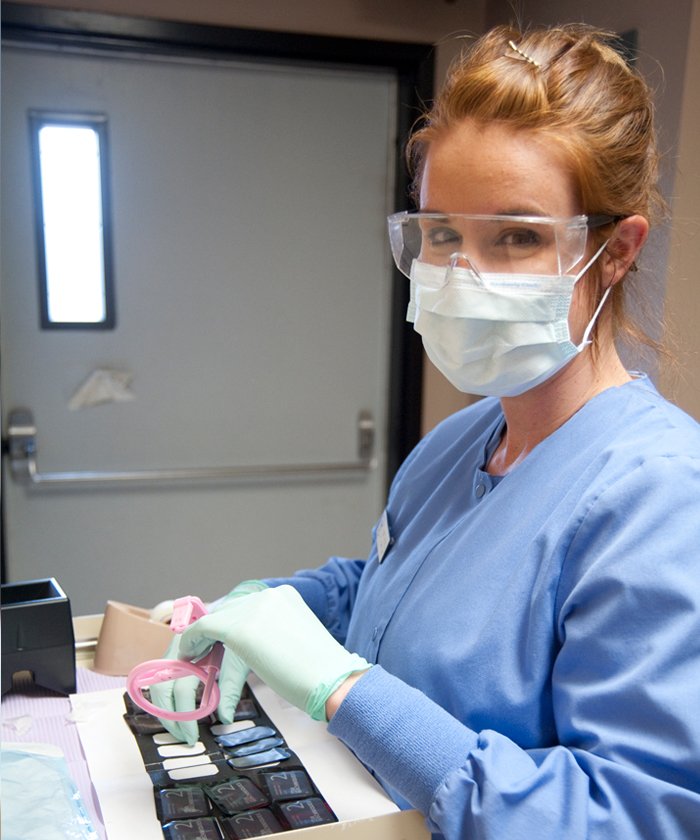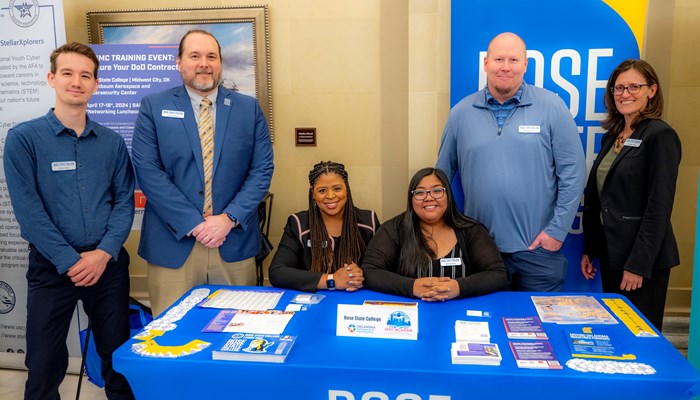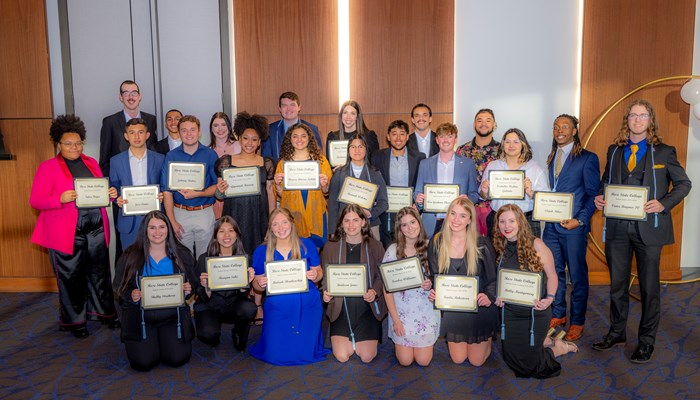Career-Launching Degrees: Dental Assisting Published January 2, 2019
 When you think about the fact that everyone will need dental care at some point in their life, it’s no surprise that pursuing a career in the dental industry is a great choice. Dentists and dental hygienists take care of our teeth and help us achieve our best smile – but they can’t do it alone. Dental assistants are essential to the success of dental practices and are there to ensure your experience at the dentist’s office goes as smoothly as possible. Thankfully, gaining the necessary skills to enter this growing career field can be achieved in just one year with Rose State College’s Dental Assisting Program.
When you think about the fact that everyone will need dental care at some point in their life, it’s no surprise that pursuing a career in the dental industry is a great choice. Dentists and dental hygienists take care of our teeth and help us achieve our best smile – but they can’t do it alone. Dental assistants are essential to the success of dental practices and are there to ensure your experience at the dentist’s office goes as smoothly as possible. Thankfully, gaining the necessary skills to enter this growing career field can be achieved in just one year with Rose State College’s Dental Assisting Program.
What Does a Dental Assistant Do?
Dental assistants are valuable members of a dental team and have the opportunity to work in an exciting, fast-paced, and challenging environment. When it comes to the function dental assistants play in a dental office, it’s pretty self-explanatory – they assist dentists. But, there are a plethora of duties assisting a dentist incorporates, including:
- Ensuring patients are comfortable and at ease during their appointment
- Preparing patients and the dental work area for treatments and procedures
- Sterilizing all dental instruments
- Handing instruments to dentists during procedures
- Drying patients’ mouths using suction hoses and other equipment
- Instructing patients in proper oral hygiene (don’t forget to floss!)
- Exposing and scanning digital images and completing other lab tasks (under the direction of a dentist)
- Keeping records of dental treatments for each patient
- Scheduling patient appointments
- Working with patients on billing and payment
If certified to perform expanded duties, dental assistants also perform coronal polishing (removing plaque from teeth), sealant placement, fluoride application, radiography, topical anesthetic application, and assist with the administration of nitrous oxide.
Like in all health care positions, interacting with patients throughout the day requires dental assistants to be personable and have good patient care skills. Dental assistants must also be a team player, be willing to learn, be a good communicator and listener, take ownership of their work, and show initiative.
Job Outlook for Dental Assistants in Oklahoma
According to the Bureau of Labor Statistics, there should be 64,600 new openings for dental assistants across the U.S. by 2026, equating to a projected employment growth of more than 19 percent. This increased demand for dental assistants has come about due to current generations being more committed to their dental hygiene than their predecessors. Younger people are recognizing the need for more frequent visits to the dentist and are thus booking more appointments. Expanded health care coverage for dental procedures has also increased the number of patients searching for dental care.
Nationally, dental assistants earn $37,630 on average and in Oklahoma, the average salary was $35,180 in 2017. The vast majority of dental assistants find employment in private dental offices, with others working in physician offices, outpatient care centers, federal government facilities, and dental school clinics. Not only are dental assistants equipped to work in general dentistry, but they’re also able to work in specialty practices such as orthodontics, oral surgery, periodontics, prosthodontics, and endodontics.
Dental Assisting Certification Process
To qualify for certification, dental assistants must graduate from an accredited program and complete the Dental Assisting National Board. After passing the exam, they will earn the credentials of Certified Dental Assistant (CDA). Rose State’s accredited dental assisting curriculum ensures students are both eligible to sit for the Dental Assisting National Board examination and earn the permits required by the state of Oklahoma and the Oklahoma Board of Dentistry in order to perform expended dental assisting duties.
“The Dental Assisting Program at Rose State helps to prepare students to graduate with all four expanded duties that require special certification,” Coordinator of the Dental Assisting ProgramMichelle Gaddy says. “These expanded duties allow our students to expose and scan radiographs, polish teeth, place sealants, and assist with nitrous oxide administration.”
 Dental Assisting Program at Rose State
Dental Assisting Program at Rose State
Rose State’s Dental Assisting Program has been accredited by the Commission on Dental Accreditation of the Dental Association for more than 30 years, allowing us to prepare future dental assistants to successfully enter the workforce. By the end of the one-year program, students will have completed 300 hours of clinical practice earned by working with students in Rose State’s Dental Hygiene Program, students at the University of Oklahoma College of Dentistry, and other dental practices in the Oklahoma City metro area.
The program only accepts 12 new students each year. This small class ensures that dental assisting students receive one-on-one instruction and interaction from staff and faculty members who oversee training in the classroom and in laboratory, pre-clinical, and clinical sessions.
“Our dental assisting students are highly sought out by the surrounding dentists because of their education here from Rose State,” Gaddy says.
In addition to offering the one-year Certificate in Dental Assisting program, Rose State also offers Applied Science degree in dental assisting for those with the appropriate perquisite coursework.
Thoughts from a Rose State Dental Assisting Student
Molly Blair is a current student in the Dental Assisting Program who chose Rose State because of its reputation in the dental community and convenient location. “I got interested in dental assisting because I love to help people and I feel like dental assisting is a great career to be able to help people,” she says. “I chose Rose State College because of its great environment, small campus, proximity to home, and because it is the top accredited dental assisting school in the state.”
She appreciates the program’s hands-on learning experiences and the care and effort the professors put into preparing each student for excelling in their career. “So far, this program has been very strenuous, but I have learned so much and I know that I will be very well prepared for this career. The professors are great and have done a tremendous job at making us as prepared as possible for once we finish the program. My favorite things about the dental assisting program at Rose State is the hands-on learning that we get in the clinic and how close I have gotten to my fellow classmates!
Many Rose State dental assisting students go on to work in the field or pursue further dental education. “After I complete the program, I plan on working as a dental assistant then maybe further down the road continue my education in the dental field,” Blair says. “I recommend this program for anyone wanting to do something in the dental field as they will find out if the dental field is a good fit for them!”
For more information about the Dental Assisting Program, contact Michelle Gaddy at (405) 736-0289 or mgaddy@rose.edu. Ready to get started at Rose? Apply today!



